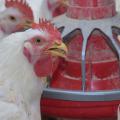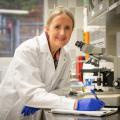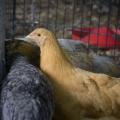Washing of hatching eggs
The washing of hatching eggs is not recommended although many producers think that visual cleanliness will increase their chances of incubation success. It is more important to stress providing good nesting facilities and frequent egg collection to reduce egg contamination. Cleaning of eggs will then become unnecessary.
The reason that washing is harmful is that washing aides bacteria to penetrate the egg shell through the small egg shell pores. The egg has many natural defenses to prevent the bacteria from moving through the shell. Washing removes the egg shell's natural defenses against bacterial entry, and water provides an environment that allows the organisms to literally swim through the shell pores. When this occurs, the egg is overwhelmed by more bacteria than it can destroy and egg contamination results. Several washing aids and antibiotics have been tested to destroy the bacteria but have not consistently improved egg hatchability.
If dirty eggs must be used for hatching, it is recommended that they be incubated in an incubator separate from the clean eggs. This will prevent contamination of clean eggs and chicks if the dirty eggs explode and during hatching.
Refer to Care and Incubation of Hatching Eggs for hatching egg care information.
Publications
News
STARKVILLE, Miss. -- Until an avian flu vaccine for chickens or other alternative is federally approved, commercial poultry operations in the U.S.
STARKVILLE, Miss. -- If egg prices have seemed higher than ever lately, it’s because they are, and consumers can place much of the blame squarely at the feet of the ongoing bird flu outbreak.
With highly pathogenic avian influenza, or HPAI, in the environment in Mississippi, owners of backyard flocks have to take extra steps to keep their chickens healthy.
Avian influenza poses an extremely low risk to human health and none to food safety in Mississippi, but its presence poses a risk to backyard flocks and the state’s $3 billion commercial poultry industry.







